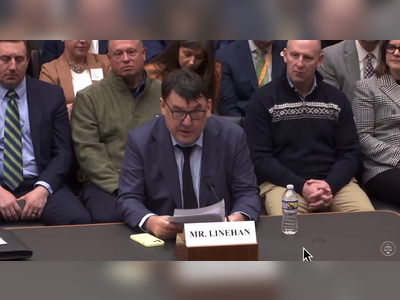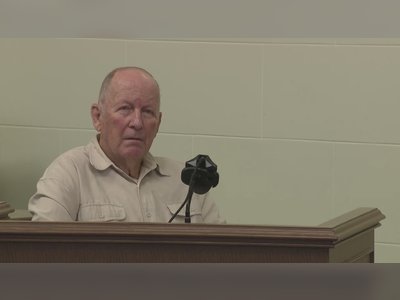
Controversy Unfolds as Hungarian Minister Excluded from National Security Meeting
Ágnes Vadai barred from questioning official linked to US sanctions; Antal Rogán, the subject, absent from session.
In a significant political development on Tuesday, Ágnes Vadai, deputy leader of the Democratic Coalition, was excluded from a meeting of the Hungarian Parliament's National Security Committee.
Vadai intended to question Antal Rogán, head of the Prime Minister's Cabinet Office, about his recent inclusion on a US sanctions list.
However, Rogán did not attend and was instead represented by a state secretary and intelligence officials.
According to a statement from Vadai, who is not a committee member, she aimed to delve into the reasons behind Rogán's sanctions, rumored to be linked to corruption allegations.
Vadai described the act of her exclusion, overseen by Fidesz parliamentary faction leader Máté Kocsis, as an obstruction.
"The minister may have evaded the committee meeting today, but sooner or later, the Hungarian citizens and the intelligence staff under his oversight deserve answers to these questions," Vadai proclaimed in a video statement.
The Democratic Coalition has called for the convening of the Parliamentary National Security Committee, citing ongoing concerns about the alleged sale of military secrets online, specifically those stolen from the Defense Procurement Agency's server.
This poses pressing national security risks, they argue, which the government seems reluctant to address effectively.
During the committee meeting, Zoltán Sas of the Jobbik party, who presides over the committee, revealed that Hungarian intelligence services had contacted their American counterparts to understand the basis for Rogán's addition to the US sanctions list.
Under the Magnitsky Act, under which these sanctions were applied, individuals are penalized globally for human rights abuses or systemic corruption.
While the US Embassy expressed concerns over escalating kleptocracy in Hungary and its threat to democracy, officials in Hungary pledged diplomatic engagement to resolve the issues, expressing hopes for potential alleviation with the incoming US administration.
Nonetheless, investigation under the Magnitsky Act typically requires substantial proof of reform from those sanctioned.
Rogán's absence, combined with the US Treasury's sanctions, has exacerbated tensions in Hungarian-American relations.
Hungarian officials, including Kocsis, criticized former US Ambassador David Pressman’s handling of the situation, implying future diplomatic dialogues might ease the tension.
The Hungarian government awaits further definition of bilateral dynamics with President Joe Biden's outgoing administration, while anticipating changes with upcoming political transitions in the United States.
For more on this developing story and its broader implications for Hungarian and international politics, follow updates on our platform.
Vadai intended to question Antal Rogán, head of the Prime Minister's Cabinet Office, about his recent inclusion on a US sanctions list.
However, Rogán did not attend and was instead represented by a state secretary and intelligence officials.
According to a statement from Vadai, who is not a committee member, she aimed to delve into the reasons behind Rogán's sanctions, rumored to be linked to corruption allegations.
Vadai described the act of her exclusion, overseen by Fidesz parliamentary faction leader Máté Kocsis, as an obstruction.
"The minister may have evaded the committee meeting today, but sooner or later, the Hungarian citizens and the intelligence staff under his oversight deserve answers to these questions," Vadai proclaimed in a video statement.
The Democratic Coalition has called for the convening of the Parliamentary National Security Committee, citing ongoing concerns about the alleged sale of military secrets online, specifically those stolen from the Defense Procurement Agency's server.
This poses pressing national security risks, they argue, which the government seems reluctant to address effectively.
During the committee meeting, Zoltán Sas of the Jobbik party, who presides over the committee, revealed that Hungarian intelligence services had contacted their American counterparts to understand the basis for Rogán's addition to the US sanctions list.
Under the Magnitsky Act, under which these sanctions were applied, individuals are penalized globally for human rights abuses or systemic corruption.
While the US Embassy expressed concerns over escalating kleptocracy in Hungary and its threat to democracy, officials in Hungary pledged diplomatic engagement to resolve the issues, expressing hopes for potential alleviation with the incoming US administration.
Nonetheless, investigation under the Magnitsky Act typically requires substantial proof of reform from those sanctioned.
Rogán's absence, combined with the US Treasury's sanctions, has exacerbated tensions in Hungarian-American relations.
Hungarian officials, including Kocsis, criticized former US Ambassador David Pressman’s handling of the situation, implying future diplomatic dialogues might ease the tension.
The Hungarian government awaits further definition of bilateral dynamics with President Joe Biden's outgoing administration, while anticipating changes with upcoming political transitions in the United States.
For more on this developing story and its broader implications for Hungarian and international politics, follow updates on our platform.
AI Disclaimer: An advanced artificial intelligence (AI) system generated the content of this page on its own. This innovative technology conducts extensive research from a variety of reliable sources, performs rigorous fact-checking and verification, cleans up and balances biased or manipulated content, and presents a minimal factual summary that is just enough yet essential for you to function as an informed and educated citizen. Please keep in mind, however, that this system is an evolving technology, and as a result, the article may contain accidental inaccuracies or errors. We urge you to help us improve our site by reporting any inaccuracies you find using the "Contact Us" link at the bottom of this page. Your helpful feedback helps us improve our system and deliver more precise content. When you find an article of interest here, please look for the full and extensive coverage of this topic in traditional news sources, as they are written by professional journalists that we try to support, not replace. We appreciate your understanding and assistance.











